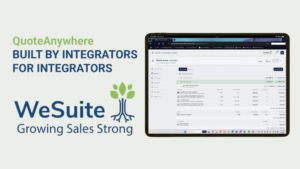Time to Re-Tool? How to Boost Your Security Sales with Data-Driven Intelligence
Your sales data is a precious commodity that can provide invaluable sales intelligence to boost sales and guide growth strategies. Are you optimizing its value? Here are important questions that, with the help of the right software, your sales data can quickly answer. Make sure you’re putting this intel to work for your organization.

By Tracy Larson
There’s been plenty written about how marketing teams can leverage data like web traffic, social media interest and email “opens” to customize messaging, nurture leads and help their sales team build a pipeline. Less often discussed is how sales teams can leverage their sales data to close more deals and make those deals more profitable. Especially today, when the world around us is changing and we need to think and act differently.
Robust contact-to-contract sales management platforms provide security sales organizations with visibility into a wealth of data that can inform and guide sales strategies, finesse employee behaviors to improve sales performance, and generate higher overall margins and close ratios.
Here are some of the important questions your sales data can answer. Ask yourself: Are you putting your sales intel to work for you?
What’s Profitable and What’s Not?
All sales are not created equal…even if they invoice for the same amount. It’s their profitability and value that matters. Organizations are wise to look at average sales, gross profit and recurring revenue over an extended period to understand the total value of contracts and compare these averages to different markets, customer types, product solutions and services, to name a few. Figure out what sort of sales make the most profitable money for you and your company, and which involve more pain than gain.
Then, structure your sales plan to promote prospecting in this direction. Understanding what targets are the best provides you the top priorities to focus your time and energy on. Companies that figure this out also know to provide commission incentives that encourage the sale of products and services with the highest margins and best close rates within markets, customer types and solution systems. Whether these are integrated solutions with service agreements, extended warrantees or something else entirely, make sure your sales representatives are personally motivated – and compensated – for putting these opportunities in front of every single customer who might be interested.
As for the sales that aren’t making much money…it’s important to understand why? What do they have in common? Is there something you can correct through changes in your quoting process? If not, maybe it’s time to discourage these types of sales, or to stop accepting these sales altogether. Perhaps a different mix of products and services can be offered to increase the value of these sales, thereby keeping the market and accounts relevant and in line with revenue goals.
Who’s Your Base?
Analyze sales reports to create a profile of customers who are making the most highly profitable purchases. Do they come from specific industries or markets? Are they concentrated in certain geographical areas? Do they tend to be a certain size? What’s the role of the decision maker you’re dealing with at these organizations? Whatever their profile, you want more customers like these! If limited marketing dollars are a concern, using them to target and expand upon this lucrative base is a safe strategy offering an easy ROI. And, setting specific sales targets for these types of customers, with special bonuses attached for bringing in new ones, will help keep your sale team focused on where the money is.
Where Are You Losing Out?
Too often, sales teams are focused exclusively on their “wins”; the opportunities that slipped away are quickly forgotten. That’s a mistake, as each loss offers multiple data points that can help your team to learn and grow. Finding commonalities across projects you lost is crucial to identifying where your company is not competitive. Do these jobs involve solutions that are overly labor-intensive to install? Do they involve a large up-front investment? Are customers more hesitant to commit to certain types of payment schedules, be they monthly, quarterly or annual? Was your inability to preserve use of legacy equipment a non-starter? Are you new to working with customers in that industry, or geographic market, and lack a proven track record?
Until you understand why you’re losing out on certain opportunities – what obstacles are in your path – it’s impossible to develop effective strategies to address them. Sometimes there will be a fix, and sometimes there won’t be. If there is, then great! Makes some changes and see if those types of sales increase. But an equally valuable lesson is knowing which jobs your team should steer clear of. Everyone wins when the majority of their energy is focused on chasing, and quoting, opportunities that have statistically higher close ratios.
How Can You Upsell to Current Customers?
You know what they say about “A bird in the hand…” Well, those birds need to continue generating revenue. You worked hard to win your customers. Keeping in touch with them, making sure their needs remain met and bringing new offerings to their attention, is how you keep those relationships fresh, relevant and profitable.
Your sales management software provides a treasure-trove of data that can make your periodic outreach calls to customers more focused and meaningful. This is especially true if your sales platform is tied to your CRM, where you’ve documented notes and past conversations that provide insight into customer’s past concerns and future plans. Creating prospecting plans, activities and reminders to perform call backs ensures outreach is happening.
There are many reasons a customer may be receptive to an upsell. Has their business changed? Does a solution you’ve sold offer new capabilities or options? Is the customer concerned over an industry merger or acquisition that may affect the lifespan of systems they have in place? Proactively offering a migration path is a huge plus for customers.
Calling to “just check in” regularly is a good idea. Calling with specific, data-driven questions that can lead to an upsell is a great one.
Who Needs My Help?
Sales data identifies top performers. It also shows who needs help.
Data-driven sales coaching allows managers to target the areas where salespeople most need to improve. Sales reps who are seeing poor conversion rates at top or mid-funnel may need to work on outreach tactics and presentation of your company’s products and services, whereas sales reps who struggle with bottom funnel conversions need to work on customer collaboration, qualification and closing of deals.
Sales management software can also indicate which tasks salespeople are struggling with and help them to streamline the process. For example, a sales rep may be losing sales because he’s taking too long to turn around proposals and quotes. The right software, along with training, can help to automate much of that process. Compiling quotes and supporting documents quickly, speeding up approvals, and getting proposals to customers asap, ready to sign, before the competition ever has a chance.
What’s Your Data Telling You?
Real-time data available through today’s sales management software is invaluable for security companies looking to increase sales. Not only is it a window into “what’s been,” but when dissected and leveraged properly, it can draw a roadmap to your company’s future – offering powerful insights that drive sales strategies and inform critical business decisions. Make sure you’re putting its power to work for you!
Recent Posts

WeSuite Expands Its QuoteAnywhere to a Full-Featured Stand-Alone Sales Platform
WeSuite, a manufacturer of award-winning sales management software for security technology sales and service providers, is excited to announce the expansion of its web-based sales software, QuoteAnywhere, to a full-featured, stand-alone, lead-to-close sales platform.

WeSuite President Tracy Larson Inducted into Security Sales & Integrations Industry Hall of Fame
WeSuite, a manufacturer of award-winning sales management software for security technology sales and service providers, announced today that Tracy Larson, WeSuite President and Co-Founder, has been inducted into the Security Sales & Integration’s Industry Hall of Fame.

Are You Getting the Most Out of Your CRM? Start by Asking these 5 Simple Questions
Your sales pipeline is your lifeline. It tells you where your deals stand, where your time should go, and how close you are to hitting your number. And your CRM? It’s the tool that keeps your pipeline in check.

Is There a Secret to Closing Security Sales Faster? Here Are Seven!
Pushy, high-pressure sales tactics turn off buyers – we’ve all been there! Fortunately, you can increase your on-the-spot close ratio by being buyer and solution oriented with sales automation software like QuoteAnywhere from WeSuite to support your sales efforts.
